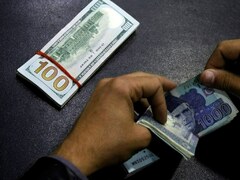The Indonesian rupiah softened on Tuesday as the country posted a smaller-than-expected trade surplus and on concerns over the outcome of the presidential election next week, while most emerging Asian currencies rose on the dollar's broad weakness. The rupiah eased 0.2 percent to 11,865 per dollar as of 0505 GMT after data showed the trade balance returned to a surplus of $70 million in May, lower than a forecast of a $410 million, as both exports and imports fell more than expected.
Earlier, spot rupiah gained as much as 0.8 percent to 11,755 per dollar, its strongest since June 2, as offshore funds such as leveraged accounts bought the currency in non-deliverable forwards markets. "Export growth still came in weaker than expected and import growth delivered the trade surplus outcome, still import growth is now on a trend consistent with a further softening in the economic back drop," said Jonathan Cavenagh, senior FX strategist with Westpac in Singapore.
The rupiah is expected to gain slightly in the near term but find resistance around the low-11,800 and high-11,700 area, Cavenagh added. Growing uncertainty over the presidential election on July 9 served another blow to the rupiah. Indonesia's ruling Democratic Party, headed by President Susilo Bambang Yudhoyono, said on Monday it was backing presidential hopeful Prabowo Subianto ahead of the election, media said.
"It could trigger capital outflows," said a Jakarta-based trader, referring to Prabowo's possible victory in the vote. The rupiah has lost about 5 percent in the past three months, indicating investors are preparing for the volatility and weakness that could ensue should the presidential election be won by Prabowo.
The Philippine peso gained as much as 0.3 percent to 43.54 per dollar, its strongest since June 9, as investors dumped dollar holdings after stock inflows on Monday. Foreign investors bought a net 1.0 billion peso ($22.9 million) worth of Manila shares in the previous session, according to the Philippine Stock Exchange data.
Investors took profits from the peso on caution that the central bank may not allow the currency to strengthen past 43.50, traders said. The Taiwan dollar rose from the previous close, which traders said was weaker than Monday's high partially due to the central bank's last-minute intervention. Strong local stocks on some inflows and a firm yuan supported the Taiwan dollar, traders said.
The currency failed to extend gains as oil importers and some foreign companies bought the US dollar for payments. ANZ recommended buying the won against the Taiwan dollar as dividend repatriation was likely to put pressure on the island's currency, while the won was expected to be supported by the trade surplus. "With Taiwanese companies going ex-dividend by at least USD 7.5 billion in July, and Korea's trade balance continuing to post strong surpluses, we expect KRW to outperform TWD again this July," it said.
BR100
15,103
Increased By
140.9 (0.94%)
BR30
42,619
Increased By
540.8 (1.29%)
KSE100
148,196
Increased By
1704.8 (1.16%)
KSE30
45,271
Increased By
438.2 (0.98%)






















Comments
Comments are closed.